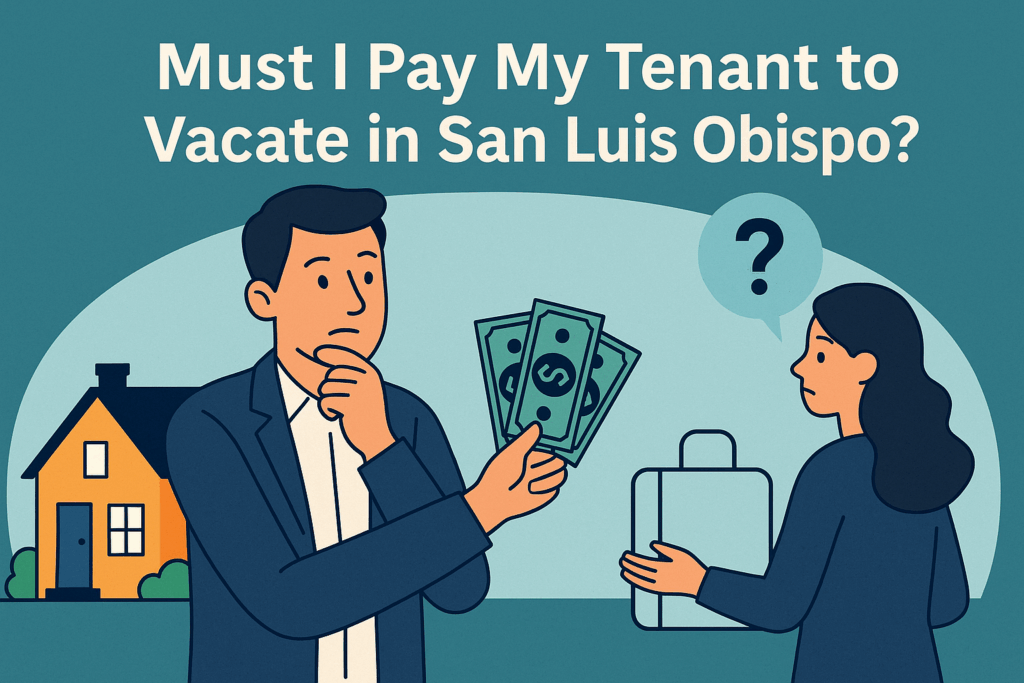
Navigating the eviction process in San Luis Obispo can be tricky for landlords, especially with California’s Tenant Protection Act (TPA) and laws like Civil Code Section 1946.2. If you’re wondering whether you must pay your tenant to move out, you’re not alone. Here’s what you need to know.
Meet Your Attorney At Frederick Law Firm, William Frederick, an experienced eviction attorney who has mastered California’s evolving landlord-tenant laws, including the Tenant Protection Act and traditional common law. He has a proven track record helping San Luis Obispo and Santa Maria landlords navigate complex eviction processes efficiently and effectively.
Understanding the Tenant Protection Act (TPA)
California’s Tenant Protection Act of 2019, codified at Civil Code Section 1946.2, established “just cause” eviction rules and relocation assistance requirements in many situations.
- Applies to most residential properties built before January 1, 2005.
- Limits the reasons a landlord can terminate a tenancy.
- May require landlords to pay relocation assistance or waive rent when ending a tenancy without tenant fault.
If you’re unsure whether your property is covered, check if your property qualifies under the Tenant Protection Act.
When Are Landlords Required to Pay Relocation Assistance?
In San Luis Obispo and throughout California, relocation assistance is usually required if you’re terminating a tenancy for “no-fault” reasons as defined under Civil Code § 1946.2(b)(2), such as:
- Substantial remodel of the property (Civil Code § 1946.2(b)(2)(D))
- Owner or family member moving into the rental (Civil Code § 1946.2(b)(2)(A))
- Withdrawal of the property from the rental market (Civil Code § 1946.2(b)(2)(C))
Forms of Relocation Assistance:
- Direct payment to the tenant equal to one month’s rent.
- Written waiver allowing the tenant to live rent-free for the final month.
Important: You must include notice of the relocation assistance in the written termination notice.
Learn more about lawful eviction notice procedures at the California Courts Self-Help Guide.
You can also consult with the Frederick Law Firm for personalized advice, and explore other landlord-tenant articles on our blog.
Exceptions: When Relocation Payment Is Not Required
Certain types of properties and situations are exempt from the Tenant Protection Act’s relocation payment requirements under Civil Code § 1946.2(e). These exemptions include:
- Single-family homes or condominiums that are:
- Not owned by a corporation, REIT, or LLC with a corporate member (Civil Code § 1946.2(e)(1)); and
- The tenant was properly notified in writing of the exemption (Civil Code § 1946.2(e)(1)).
- Housing constructed within the last 15 years (Civil Code § 1946.2(e)(7)).
- Affordable housing restricted by deed or recorded agreements (Civil Code § 1946.2(e)(3)).
- Dormitories operated by educational institutions (Civil Code § 1946.2(e)(4)).
- Mobilehomes under the Mobilehome Residency Law (Civil Code § 1946.2(e)(5)).
- Units where the landlord shares living space with the tenant (Civil Code § 1946.2(e)(6)).
- At-fault evictions — Evictions based on tenant misconduct (e.g., nonpayment of rent, lease violation, nuisance, criminal conduct) do not require relocation assistance (Civil Code § 1946.2(b)(1)).
Important: Even when an exemption applies, landlords must properly disclose the exemption to the tenant in writing, either in the lease agreement or through a separate written notice during the tenancy. Failure to provide proper written notice as required by Civil Code § 1946.2(e)(1) may result in the property becoming subject to the Tenant Protection Act’s requirements, including just cause eviction standards and relocation assistance obligations.
What Happens if I Offer a Tenant a “Cash for Keys” Agreement?
“Cash for keys” agreements are a private negotiation where you offer your tenant money to voluntarily move out, avoiding formal eviction. These are legal but must be handled carefully:
- Document everything in writing.
- Make sure the tenant signs a clear release.
- Avoid coercion or harassment.
A properly structured agreement can save time and expense. However, if mishandled, it could lead to lawsuits. Review best practices with an eviction attorney first.
Pro Tip: Confirm Tenant Protection Act Coverage Before Taking Action
Before serving a notice or offering a move-out agreement, double-check whether your property is covered by the Tenant Protection Act. Mistakes can result in penalties or wrongful eviction claims. Use the California Legislative Information site to review the latest statutes.
FAQ About Paying Tenants to Leave in San Luis Obispo
Q: What if my tenant refuses my cash offer to move out? A: You cannot force them to accept. You would then need to proceed with a formal eviction under the “just cause” rules.
Q: Can I raise the rent to encourage a tenant to leave? A: Be careful. Rent increases are subject to statewide rent control under the TPA. Retaliatory rent increases are illegal.
Q: How much relocation assistance must I pay? A: Generally, the equivalent of one month’s rent, either paid directly or waived.
Q: Can I evict without paying relocation assistance if the tenant is at fault? A: Yes. If the eviction is for “at-fault” reasons, such as nonpayment of rent or breach of lease, no relocation assistance is required.
Q: How do I know if my property is exempt from the Tenant Protection Act? A: Factors include the property’s age, type (e.g., single-family home), and ownership structure. Check Civil Code § 1946.2 for details.
Need help navigating a tenant move-out in San Luis Obispo or Santa Maria?
At Frederick Law Firm, we have extensive experience representing landlords throughout San Luis Obispo County. Contact us today or call (805) 929-1120 for a consultation and ensure your eviction process is compliant and effective.
Disclaimer: This blog post is for informational purposes only and does not constitute legal advice. Consult with a qualified attorney for advice about your particular situation.
